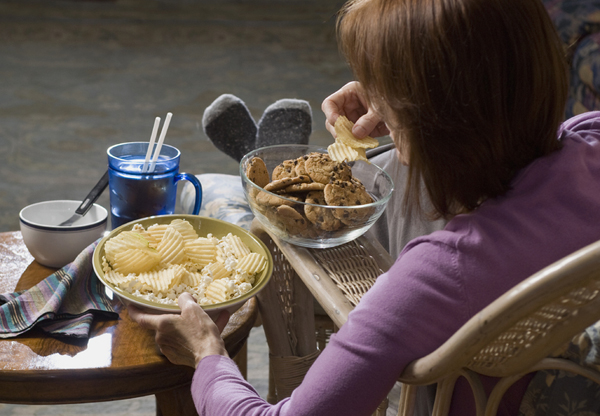Is a Little Nibbling OK? Munching Not Linked to Obesity

A little nibbling between meals may not show up on your waistline, a small study of Norwegian women suggests.
Participants in the study who admitted to nibbling morsels of food during the day were no more likely to have a high body mass index (an indicator of body fatness) than those who said they didn't nibble. There was also no link between nibbling and eating more meals or snacks, or episodes of binge eating, the researchers said.
Nibbling was defined as unplanned or repetitious eating between snacks and meals, in which the women felt that they were in control of their eating. (If they felt they had lost of control over their eating, the behavior was considered binge eating.)
It's this control that is likely the reason no link was found between nibbling and a high body mass index, the researchers said.
However, experts caution that, despite the new findings, unplanned eating is usually not a good idea, as it can lead to consumption of excess calories.
"Nibbling's a pretty bad habit," said Katherine Tallmadge, a registered dietitian and author of "Diet Simple" (LifeLine Press, 2011). The only instance in which nibbling may be beneficial is if you're munching on fruits and vegetables, Tallmadge said.
The study will be published in an upcoming issue of the journal Eating Behaviors.
Sign up for the Live Science daily newsletter now
Get the world’s most fascinating discoveries delivered straight to your inbox.
Controlled nibbling
The researchers surveyed 58 women, between ages 19 and 41, from two universities in eastern Norway. Participants reported how often they nibbled during the last 28 days; the researchers instructed them to distinguish between nibbling, and snacks and meals.
The researchers grouped the women according to how many days they reported nibbling, with 9 percent of women reporting no nibbling, and 5 percent nibbling every day. The largest group of women, 40 percent of the study participants, reported nibbling on six to 12 days.
Nibbling was not related to a woman's body mass index, how often she ate meals and snacks, binge eating or shape and weight concerns.
The researchers do not know whether any individual participant who nibbled gained weight — the researchers did not weigh the women, said study researcher Deborah Reas, a psychologist at Oslo University Hospital. If nibbling causes a person to eat more calories than they burn, it will likely lead to weight gain over time, Reas said.
It's also not clear if nibbling would be detrimental beyond a 28-day period, Reas said.
Why planning is best
The study relied on participants to report how often they nibbled, and this method of collecting dietary information is frequently unreliable, Tallmadge said. People often misremember what they ate, or don't realize how much they've consumed, she said.
The study also did not specify what the participants were nibbling on, Tallmadge said.
In the United States, people usually choose to nibble on foods high in calories and low in nutrients, Tallmadge said. In addition, in Tallmadge's experience, people who nibble report that their hunger is less satiated at their next meal, even if they eat more than they normally would.
That's not to say all snacking is bad. But people trying to keep to a healthy weight should plan their snacks, and eat something nutritious. If they don't plan their snacks, they often end up scoffing down whatever is available, which is usually junk food, Tallmadge said.
Pass it on: Nibbling between meals may be OK if you don't consume extra calories, but it's best to plan your snacks.
This story was provided by MyHealthNewsDaily, a sister site to LiveScience. Follow MyHealthNewsDaily staff writer Rachael Rettner on Twitter @RachaelRettner. Find us on Facebook.

Rachael is a Live Science contributor, and was a former channel editor and senior writer for Live Science between 2010 and 2022. She has a master's degree in journalism from New York University's Science, Health and Environmental Reporting Program. She also holds a B.S. in molecular biology and an M.S. in biology from the University of California, San Diego. Her work has appeared in Scienceline, The Washington Post and Scientific American.










